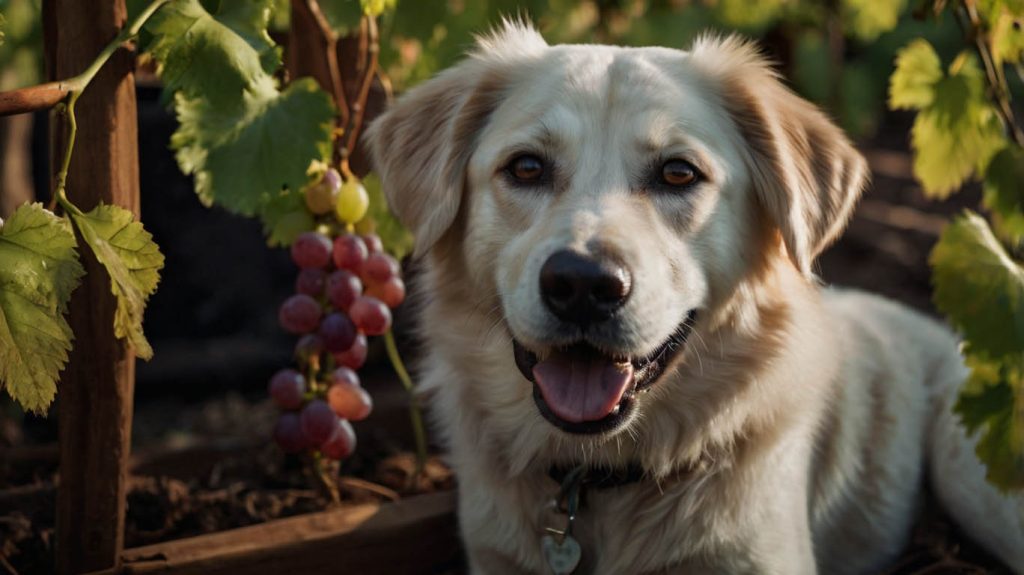Are Grapes Toxic to Dogs? The Definitive Answer and Emergency Guide
The story is a heart-stoppingly common one for dog owners. You’re enjoying a healthy snack, a single grape falls to the floor, and before you can react, your dog has gobbled it up. A wave of panic sets in, followed by a frantic search for the answer to a critical question: “are grapes toxic to dogs?” In a world of conflicting online advice, you need a clear, authoritative, and immediate answer.
This comprehensive guide will provide that clarity and walk you through the entire journey of understanding this dangerous toxicity. First, we will give you the unambiguous answer. Then, we will explore the science behind why they are toxic and the severe health risks involved. Finally, and most importantly, we will provide a step-by-step emergency action plan. Consequently, you will be fully prepared to protect your dog and act decisively if an accident ever happens.
The Unambiguous Answer: Are Grapes Toxic to Dogs?
Let there be no confusion or ambiguity: Yes, grapes are extremely toxic to dogs.
This applies to all types of grapes—red, green, purple, and seedless. It also applies to all grape products, including raisins, currants, and even grape juice. The level of toxicity can be unpredictable, and for some dogs, even a single grape can be enough to cause a life-threatening reaction. Therefore, the official veterinary consensus is that there is no safe amount of grapes or raisins for a dog to consume. The question of are grapes toxic to dogs has been answered with a definitive yes by the entire veterinary community.

The “Why”: What Makes Grapes Toxic to Dogs?
For many years, the exact reason for grape toxicity was a frustrating mystery. Vets knew they were dangerous, but the specific toxin was unknown. However, recent groundbreaking research has finally identified the likely culprit: tartaric acid.
- The Tartaric Acid Connection: Tartaric acid is present in grapes in varying amounts depending on the type, ripeness, and where they were grown. This explains why one dog might eat a few grapes and be fine, while another dog eats just one and suffers severe consequences. Their individual sensitivity to tartaric acid is the unknown variable. This is a critical point to understand when considering are grapes toxic to dogs.
- The Main Consequence: Acute Kidney Failure: The ingestion of tartaric acid can lead to a rapid and severe shutdown of the dog’s kidneys. This condition, known as acute renal failure, is a medical emergency and can be fatal if not treated aggressively and immediately.
The Critical Question: How Many Grapes Are Toxic to Dogs?
This is the question every panicked owner asks, but unfortunately, there is no safe answer.
- No Known Toxic Dose: There is no established toxic dose. A large dog could be severely affected by a few grapes, while a small dog might eat one and show no signs (though the internal damage may still be occurring).
- The “Better Safe Than Sorry” Rule: Because we cannot predict an individual dog’s sensitivity, the only safe approach is to treat any ingestion of grapes or raisins as an emergency. The risk is simply too high to “wait and see.”
Recognizing the Symptoms of Grape Toxicity in Dogs
If you suspect your dog has ingested grapes, you must watch for the signs of poisoning. These symptoms often develop within 6 to 12 hours.
Early Warning Signs of Grape Toxicity (Within 24 Hours)
These are the first signs that your dog’s body is reacting to the toxin.
- Vomiting and/or Diarrhea: This is often the first and most common sign.
- Lethargy, Weakness, and Unusual Quietness: Your dog may seem sluggish and uninterested in their surroundings.
- Loss of Appetite: A refusal to eat is a significant red flag.
- Dehydration: You might notice a dry nose and gums.
Severe Signs of Acute Kidney Failure (24-48 Hours)
If the condition progresses, you will see signs of kidney failure.
- Abdominal Pain: Their belly may be tender to the touch.
- Increased Thirst and Urination (Initially): This can be followed by a sudden decrease or complete absence of urination, which is a sign of total kidney shutdown.
- Foul Breath with an Ammonia-like Odor: This is caused by the buildup of waste products in the blood.

Emergency Action Plan: What to Do Immediately if Your Dog Eats Grapes
If you know or even suspect your dog has eaten a grape or raisin, time is of the essence. Do not wait for symptoms to appear.
Step 1: Call a Professional Immediately
This is your first, non-negotiable step. Immediately call:
- Your Veterinarian or the nearest Emergency Animal Hospital.
- The ASPCA Animal Poison Control Center: (888) 426-4435 (A consultation fee may apply)
- The Pet Poison Helpline: (855) 764-7661 (A consultation fee may apply)
These professionals can assess the situation based on your dog’s weight and the amount ingested and give you the most accurate advice.
Step 2: Do NOT Induce Vomiting Unless Instructed
While inducing vomiting (decontamination) is often a part of treatment, you should never do it without the explicit instruction and guidance of a veterinary professional. Using the wrong method or dosage of hydrogen peroxide can be harmful.
What to Expect at the Vet: How Grape Toxicity is Treated
If you get your dog to the vet quickly, they will begin aggressive treatment to try and prevent kidney failure.
- Decontamination: The vet will likely induce vomiting and then administer activated charcoal to absorb any remaining toxins in the stomach.
- IV Fluids: They will start your dog on intravenous (IV) fluids to “flush” the kidneys (a process called diuresis) and protect them from damage.
- Bloodwork Monitoring: The veterinary team will monitor your dog’s kidney values with blood tests for at least 48-72 hours to ensure the kidneys are functioning properly.
Prevention: Keeping Your Dog Safe
The best treatment is always prevention.
- Kitchen Safety: Store grapes and raisins well out of your dog’s reach, never in a fruit bowl on the counter.
- Beware of Hidden Sources: Be mindful of foods that may contain raisins, such as trail mix, granola, baked goods (like raisin bread or fruitcake), and some salads.
- Educate Everyone in the Household: Make sure family members, guests, and children understand that these fruits are a serious danger.
Conclusion: A Clear Answer to a Dangerous Question
The question of “are grapes toxic to dogs?” has a clear and serious answer. These seemingly harmless fruits pose a significant and unpredictable threat to our canine companions. By understanding the risks, knowing the symptoms, and having a clear emergency plan, you are equipped to protect your pet. Immediate action is the key to a positive outcome, so never hesitate to call your veterinarian if you have even the slightest concern.


